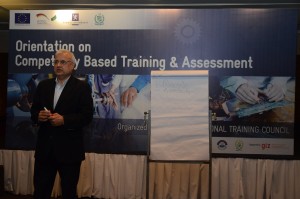 The Competency Based Training and Assessment (CBT&A) approach ensures better employable skills for graduates in the labour market and plays a vital role to bring a paradigm shift in the perception about the Technical and Vocational Education and Training (TVET).
The Competency Based Training and Assessment (CBT&A) approach ensures better employable skills for graduates in the labour market and plays a vital role to bring a paradigm shift in the perception about the Technical and Vocational Education and Training (TVET).
These remarks were made at an orientation on CBT&A held on May 24, 2017 organized at a local hotel by the Punjab Vocational Training Council (PVTC) in collaboration with the TVET Reform Support Programme, funded by the European Union, the Federal Republic of Germany and the Royal Norwegian Embassy, implemented by the Deutsche Gesellschaft für Internationale Zusammenarbeit (GIZ) GmbH in close collaboration with the National Vocational and Technical Training Commission (NAVTTC) as well as provincial Technical Education and Vocational Training Authorities (TEVTAs) and private sector organizations.
CBT&A is a latest training approach in Pakistan, which ensures quality skills training delivery to indigenously meet the job market requirements. In this approach learners are trained through practical demonstrations and are assessed on the basis of their competence. PVTC officials including Syed Ghazanfar Abbas and Bushra Nawaz apprised that PVTC is offering CBT&A courses in 60 institutions across the province; where, this approach involves development of curriculum through detailed participation of trainers and counsellors from the industry.
 This unique method of curriculum development and training induces a pre-employment learning mechanism in the graduates enabling them to get decent employment opportunities in the market. This particular approach also enables the employers to seek relevant trained workforce for efficient work performance.
This unique method of curriculum development and training induces a pre-employment learning mechanism in the graduates enabling them to get decent employment opportunities in the market. This particular approach also enables the employers to seek relevant trained workforce for efficient work performance.
Dr. Tauqeer, Head of Examination from PVTC, while apprising on the assessment method in CBT&A approach added that human resource development has brought results for reduction of the poverty across the globe through technical and vocational education and training. He also shed light on the difference between CBT&A training approach and conventional training approach adding that the inclusion of the industry from the identification of demand driven trades ensures active participation of the private sector leading towards output oriented economic system.
Participants from private and public sector institutes were also present in this session, where a detailed presentation and candid discussion on curriculum development, its revision process and latest assessment criteria helped the participants to have a broader understanding of CBT&A, while recognizing the importance of TVET sector in economic development of the country.
 Pakistan TVET REFORM Support Programme Technical and Vocational Education and Training (TVET) Reform support Programme
Pakistan TVET REFORM Support Programme Technical and Vocational Education and Training (TVET) Reform support Programme








